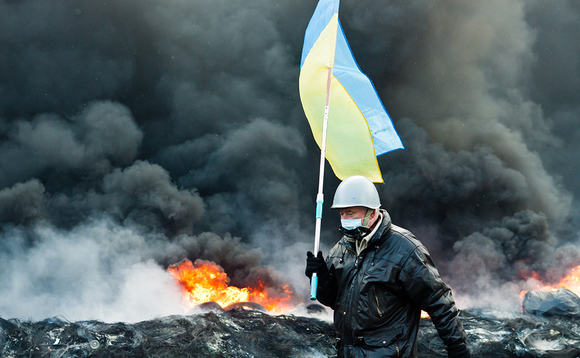
Ukrainian investors remain defiant amid Crimea crisis

Financial markets have reflected the political tensions in Ukraine. Amy King investigates the potential impact on the country’s private equity landscape
Financial markets have imposed more arduous punishments on Russian belligerence than global leaders in recent weeks. Russian stocks plummeted in the days following Putin's invasion of Crimea, sparking concern among investors. This regional tension has been felt in Ukrainian private markets too.
At the time of writing, Ukraine's Hryvnia was trading at nine to the dollar. Local private equity players manage euro-denominated funds, thus resisting the devaluation of Ukrainian currency. But portfolio companies have not been as protected from the financial repercussions of regional hostility. "In the last few weeks, our portfolio has lost 20% of its valuation in dollars," says Leslie Hawrylyshyn, co-managing partner at Kiev-based Euroventures Ukraine. "It's very hard to do international transfers, and credit lines stand at 23-25%. Our portfolio is managing on a cash basis, but that's limited."
Euroventures Ukraine is one of a handful of buyout firms with a local portfolio; indeed the fund invests in Ukraine alone. Global player Advent International has retained some local presence – but having closed its Kiev office, the GP is understood to be investing opportunistically rather than as part of a formalised strategy. This is perhaps understandable given the lacklustre deaflow, with just six investments recorded in Ukraine since 2011, according to unquote" data.
"Some GPs are opportunistically looking for co-investment opportunities, but have withdrawn from the market economically. Most investors are now waiting to see political evolution," says Hawrylyshyn. The millennium sparked eight years of economic growth in Ukraine. That was dramatically extinguished by the global economic crisis, which saw GDP drop by 15% in 2008-9. Recovery began in 2010, aided by growth in neighbouring Russia, but has since remained modest. Will recent political unrest snuff out dealflow entirely?
Long game
Dragon Capital is the sole Ukrainian GP to have raised a fund after the crisis. "We were initially thinking of raising a fund prior to the crisis," says Kamil Goca, a founding partner at the firm. "But then we decided it was better to raise and invest when times were tough to take advantage of the recovery period. During that time, valuations returned to a normal level – before the crisis it was all overpriced."
"We started putting the fund together in late 08-09. It took more than one and a half years to raise. Fundraising was very hard because Ukraine had a very bad image abroad," says Goca. Europe Virgin Fund, which follows a different strategy to that considered pre-crisis, is currently 75% invested after the buyout of online payments firm Portmone at the end of last year. The majority of GPs raised funds pre-crisis; as such they are nearing the end of the fund lifecycle. What has been the impact of current tensions on existing portfolio companies?
"Our portfolio is doing ok and is EBITDA- and cash-positive," says Hawrylyshyn. "But they can't do international money transfers, so they're sitting on the cash. The impact of the last three months on turnover has been minor in local currency terms, but transfers into dollars or euros are down due to deflation. So the impact is potentially great."
For GPs looking for exits, times are tough. But for acquisition-hungry investors, now is the time to buy. "It's the perfect time to do M&A because everyone wants to get out! It really is a buyers' market, but to buy you need cash. Right now, I think the whole region is on the back-burner," says Hawrylyshyn.
Despite the potential threat to returns, LPs have remained fairly calm. The majority of capital committed to local funds is contributed by international financial institutions (IFI); the European Bank for Reconstruction and Development and the Swiss governmental development institution SECO have supported more than one local GP. "There has been no panicking reaction," says Goca. "Most of our LPs are IFIs – they're here for long-term reasons that will not be overshadowed by recent events. Let's see what the outcome of this brings; it could have positive effects on medium- to long-term outcomes."
Sandwiched between European and Russian economies, medium- to long-term growth prospects are indeed potentially strong. According to the European Commission's latest European Economic Forecast, the average GDP of the European Union is forecast to grow by 1.5% this year and Russia's is expected to rise by 2.3%. Says Goca: "Solid reforms could give good economic growth. Ukraine is underdeveloped and underestimated; GDP per capital is significantly below both Russia and the EU. We are hoping for some convergence and growth. There is potential here, and signs of hope that we will get back on track."
The Ukrainian elections on 25 May are expected to reflect the direction of the country's future political alignments, which could have a significant and positive impact on the private equity industry and the wider local business landscape. Says Goca: "The outcome [of the elections] could be positive. If real reforms are taken, there will be strong growth." But if elections do not illuminate a path to growth, the story could be different. Perhaps then it would be time to invest in those punished Russian stocks.
Latest News
Stonehage Fleming raises USD 130m for largest fund to date, eyes 2024 programme
Multi-family office has seen strong appetite, with investor base growing since 2016 to more than 90 family offices, Meiping Yap told Unquote
Permira to take Ergomed private for GBP 703m
Sponsor deploys Permira VIII to ride new wave of take-privates; Blackstone commits GBP 200m in financing for UK-based CRO
Partners Group to release IMs for Civica sale in mid-September
Sponsor acquired the public software group in July 2017 via the same-year vintage Partners Group Global Value 2017
Change of mind: Sponsors take to de-listing their own assets
EQT and Cinven seen as bellweather for funds to reassess options for listed assets trading underwater







